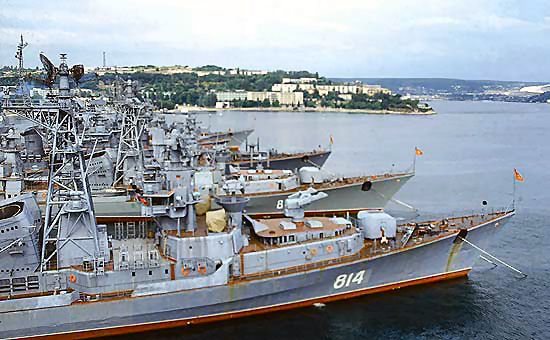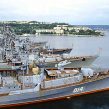
Russia, Ukraine Reportedly Close to Agreement on Black Sea Fleet Movements
Publication: Eurasia Daily Monitor Volume: 10 Issue: 46
By:

Russia and Ukraine are close to reaching an agreement on the clearance of Black Sea Fleet (BSF) vessel movements outside their bases, the Ukrainian website zn.ua reported on March 2, citing sources familiar with the talks. The sources said that Russia no longer objects to a provision that all BSF movements will have to be cleared with the Ukrainian authorities; earlier, Russia insisted that simply notifying Ukraine about the movements of BSF units outside their bases would suffice. However, understanding is yet to be reached on procedures for emergencies. Moscow believes a notification should be sufficient for emergency situation, while Kyiv insists on a prior clearance also in emergencies, according to the sources.
Ukraine had been liberal about the procedures until the military conflict between Russia and Georgia in summer 2008. Then Ukrainian President Viktor Yushchenko, who had strained relations with the Kremlin and voiced his support for Georgia, warned Russia against using BSF units in the conflict and imposed a 72-hour notification policy on BSF movements. Russia rejected the policy, claiming that it contradicted bilateral agreements.
BSF movements are regulated by a bilateral treaty from 1997, which stipulates that the Russian BSF would be based in the Ukrainian naval port of Sevastopol until 2017. However, the BSF’s stationing in Sevastopol was extended until 2042 in April 2010, when Moscow agreed to provide Kyiv a gas price discount in return. As the BSF will now stay in Sevastopol for another quarter century and while Russia is becoming more assertive in relations with its neighbors, the issue of BSF naval movements has gained in relevance for bilateral relations and regional security.
Kyiv’s position has thus far been that the provision in the BSF agreement from 1997, according to which movements of BSF units outside their bases are allowed only after prior clearance, has to be adhered to in all situations. However, Russia and Ukraine have yet to agree on technicalities such as notifying procedures, timing and the bodies authorized to take decisions, Sergey Kulik, director of the Sevastopol-based think tank Nomos has told the Jamestown Foundation. Movements of foreign military units in emergency situations, which may be declared not only in the wake of natural disasters but also during military conflicts, as well as the transportation of dangerous loads may pose a serious threat to Ukraine’s national security and independence, said Kulik.
Russia wanted to sign a new agreement on BSF unit movements during Ukrainian President Viktor Yanukovych’s visit to Moscow last October. The Kremlin’s press service had even pre-announced the signing, but no agreement was signed (UNIAN, October 22, 2012). Yanukovych had hoped to persuade Moscow to cut gas prices during the visit, yet no compromise was reached on that front either. The issue of BSF unit movements may be contingent on a new gas accord, just like another important problem to be resolved, that of BSF rearmament planned by Russia.
BSF Commander Aleksandr Fedotenkov said last July that Russia hoped to finalize a new agreement on rearmament by the end of 2012. He said the first new ship for the BSF should arrive in Sevastopol in 2014. In particular, Russia wants a new frigate and a new diesel-powered submarine for the BSF. Former Russian Member of Parliament Konstantin Zatulin suggested that gas prices could become Russia’s trump card in talks with Ukraine on the rearmament of the Black Sea Fleet (bbc.co.uk/Ukrainian, July 27–29, 2012). Nevertheless, no agreements have been reached on either the BSF or gas thus far.
Ukrainian Defense Minister Pavlo Lebedev said after meeting with his Russian counterpart Sergei Shoigu in Sevastopol on February 20 that there were no problems with Russian plans except that Ukraine and Russia had to solve procedural issues first, such as the subject of land plots leased to the BSF. Ukraine’s defense minister said the plots leased out but not used by the BSF should be auctioned off (Novy Sevastopol, February 20). The Ukrainian Ministry of Foreign Affairs said after the meeting that the BSF’s rearmament was “a new issue and it is early to speak about any agreements” (Interfax-Ukraine, February 26).
Mykola Sunhurovsky, an analyst from the Kyiv-based Razumkov think tank, suggested that Ukraine should make an agreement on Russia’s BSF rearmament contingent on the issue of inventorying the property leased to the BSF in Ukraine. Russia has been using land and buildings for the BSF in the Crimea for decades, while not allowing Kyiv to inventory them. Suspicions abound in Ukraine that some of those properties have been used for commercial purposes. Sunhurovsky also said the balance of forces in the Black Sea region should not be upset by Russian rearmament plans (nbnews.com.ua, February 26). Ukraine argues that, according to the 1997 accord, old BSF ships can be replaced with new ones only if they belong to the same type and category.
Meanwhile, the BSF is slowly turning into a heap of rusty metal. Admiral Viktor Kravchenko, a former Russian chief of naval staff, warned recently that all the BSF ships are too old to be used for patrolling the eastern Mediterranean (Interfax, March 1). Consequently, if Moscow is not able to cajole Kyiv into accepting a deal on BSF rearmament, Russia will be unable to carry out its recently announced plans to resurrect the country’s regular naval presence in the Mediterranean Sea (see EDM, March 7).




